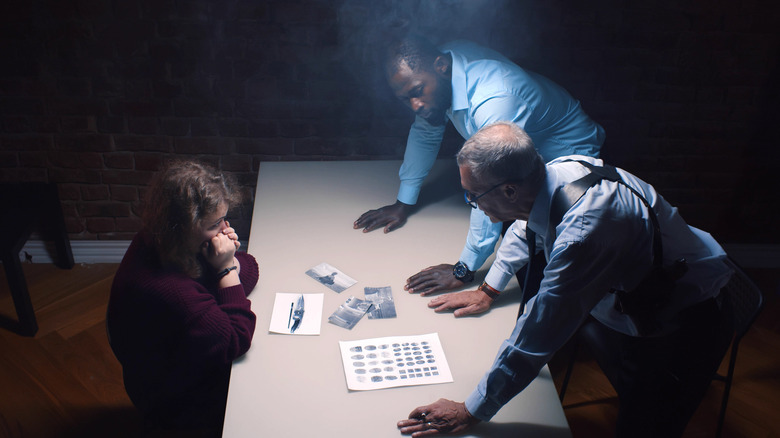Why Science Says People Admit To Crimes They Didn't Commit
We've all heard reports about people admitting to crimes that they had nothing to do with, and looking at it from the outside, one might think that it's absurd to confess to something — especially as serious as murder — if you had nothing to do with it. According to False Confessions, it's not as uncommon as one might think. In fact, it happens on a regular basis. Based on information from the Innocence Project, 29% of DNA exonerations in the country involve false confessions. This is problematic, as it not only destroys innocent lives but also prevents authorities from capturing the real perpetrator of the crime.
It's easy to say that you would never admit to something you didn't do when confronted by the authorities, but according to false confession expert Saul Kassin, it can happen to anyone. As he told NBC News, everyone has a breaking point and that, combined with the atmosphere in a cramped interrogation room, can make just about anyone say anything just to get out of an uncomfortable situation. Based on Kassin's research, a combination of pressure and various interrogation approaches may make an innocent person confess to a terrible crime (via Science).
Some people are more susceptible to pressure
As mentioned, anyone can reach their breaking point and give a false confession, but there are people who are more susceptible to interrogation techniques than others. These include younger people, those who have a limited mental capacity, and those who have substance abuse problems, per Science. According to the statistics obtained by the Innocence Project, exonerations that involved false confessions show that 49% of those who falsely confessed were not older than 21 years old, and 9% had "mental capacity issues." Per Psychology Today, the more a person is susceptible to influence, the more likely they are to give in to interrogation tactics or pressure.
Imagine being in an interrogation room for hours with someone repeatedly trying to get information from you that you don't have. Your resolve breaks, you don't have anyone else to rely on, and you just desperately want to get out of the situation. In some cases, as Saul Kassin told Live Science, people tend to forget that they have the right to remain silent or stop the interrogation and call a lawyer. Others falsely confess because they rely on being declared innocent when more information or pieces of evidence are acquired that prove they are not guilty.
Police may use deceptive tactics
Authorities use different types of tactics to get information from a person of interest or a suspect, and one of them is fabricating evidence during an interrogation. As reported by the Innocence Project, police deception is legal in the U.S., and the technique may result in a false confession. Authorities may tell a suspect that they have concrete evidence to charge them with a crime they didn't commit, and if there is "evidence," then it must be true.
This adds pressure to the person being interrogated, even if they know that they didn't commit the crime. According to Time, psychological research shows that giving a person false information may change their thoughts, beliefs, and emotions, and may even lead them to question their memories. One example is the 1973 case of Peter Reilly, an 18-year-old who was interrogated after finding his mother murdered in their home. The teen gave his full cooperation to the authorities, as he knew he was not guilty. He talked to them without an attorney, sat down to be questioned for hours, and even agreed to take a polygraph test to show them he was innocent (via Penn State University). There was no evidence against him, and he passed the polygraph test, but the officer told him that he failed. With that information, Reilly started questioning himself and he eventually confessed. He was convicted but was later exonerated after spending a few years in prison.
Diminished reasoning ability and personality factors
Being interrogated may cause exhaustion, especially if it goes on for hours. This may cause drowsiness, which is the brain's signal that it needs to rest. According to Healthline, too much stimulation to the brain — such as a lengthy and intense interrogation — can cause mental exhaustion, which in turn diminishes a person's reasoning ability and impairs judgment. It may be more difficult to make decisions and understand the consequences of actions when the brain is tired. This is one of the reasons why people may admit to something they didn't do during an interrogation.
Furthermore, some personality types are more susceptible to suggestion or intimidation. As reported by Legal Match, people who have low self-esteem, poor memory, and high anxiety are some of those who feel more vulnerable when being questioned by authority. And when the pressure gets to them, they are more likely to give a false confession to get out of the intense situation.



